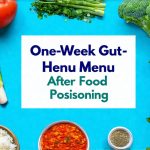Food poisoning is an unfortunate reality for many, often conjuring images of short-lived discomfort – a day spent near the bathroom followed by a return to normalcy. However, this simplistic view overlooks the significant impact foodborne illness can have on the gut microbiome and overall health. What many perceive as merely “upset stomach” can trigger a cascade of disruptions within the digestive system, extending far beyond the initial symptoms. The consequences, if left unaddressed, can manifest as chronic digestive issues, weakened immunity, and even mental health challenges.
The gut isn’t just responsible for processing food; it’s the cornerstone of our wellbeing. A diverse and thriving microbial community is crucial for nutrient absorption, immune regulation, and protection against pathogens. Food poisoning directly assaults this delicate ecosystem, often leading to a significant reduction in beneficial bacteria and an overgrowth of harmful ones. Simply “letting things settle” with a bland diet rarely provides sufficient support for genuine gut recovery; it’s akin to rebuilding a house on a cracked foundation. True healing requires a targeted approach that addresses the underlying microbial imbalances and restores optimal digestive function.
The Devastating Impact of Food Poisoning on the Gut Microbiome
Food poisoning, regardless of its source (bacteria, viruses, parasites), initiates an inflammatory response within the gut. This inflammation isn’t just limited to the immediate site of infection; it can ripple throughout the entire digestive tract. – Dysbiosis, a state of microbial imbalance, is almost always a consequence. The initial illness itself wipes out a significant portion of both good and bad bacteria, but often the beneficial bacteria struggle to repopulate effectively. This creates an opportunity for opportunistic pathogens like Candida or harmful strains of E. coli to flourish. – Furthermore, prolonged inflammation can damage the gut lining, leading to increased intestinal permeability—often referred to as “leaky gut.” This allows undigested food particles, toxins, and bacteria to enter the bloodstream, triggering systemic immune responses and contributing to chronic health issues. Understanding how a plant-rich diet protects can also be incredibly helpful during recovery.
The type of pathogen involved also influences the degree of disruption. For instance, certain bacterial infections can produce toxins that directly damage the intestinal cells, exacerbating inflammation and hindering recovery. Viral gastroenteritis, while often shorter in duration, can still significantly alter the microbiome composition. Even seemingly mild cases of food poisoning can have lasting effects, particularly in individuals with pre-existing gut sensitivities or compromised immune systems. The body’s attempt to rid itself of the pathogen through diarrhea and vomiting, while necessary, further depletes essential nutrients and disrupts electrolyte balance, adding another layer of stress on the system.
A light diet focuses primarily on minimizing irritation, but it doesn’t actively restore what has been lost. It’s a passive approach when an active one is needed. This is where targeted gut recovery protocols become essential, focusing on rebuilding microbial diversity and healing the intestinal lining. Ignoring this phase can lead to chronic digestive symptoms like bloating, gas, abdominal pain, diarrhea or constipation – as well as more systemic issues linked to impaired immunity and nutrient deficiencies. A good starting point might be building a recovery plan specific to your needs.
Beyond Bland: The Components of Effective Gut Recovery
Effective gut recovery goes far beyond a temporary bland diet. It’s about providing the necessary building blocks for microbial restoration and intestinal healing. – Probiotics are often recommended, but selecting the right strains is crucial. Not all probiotics are created equal, and different strains have different effects. A comprehensive stool analysis can help identify specific imbalances and guide probiotic selection. – Similarly, prebiotics, which are fibers that feed beneficial bacteria, play a vital role in fostering microbial growth. Incorporating prebiotic-rich foods like garlic, onions, asparagus, and bananas (in tolerated amounts) can support the re-establishment of a healthy microbiome.
However, dietary interventions alone aren’t always sufficient. – L-glutamine, an amino acid that supports gut lining repair, can be incredibly beneficial. Supplementation or increased intake through protein-rich foods may assist in sealing a leaky gut and reducing inflammation. – Addressing any underlying nutrient deficiencies is also paramount. Food poisoning often leads to malabsorption of essential vitamins and minerals, so targeted supplementation may be necessary under the guidance of a healthcare professional. Finally, managing stress levels and prioritizing sleep are crucial for overall healing, as chronic stress can further compromise gut health. The aim isn’t just about what you remove from your diet but about actively providing support for rebuilding and restoring optimal digestive function. Considering how to support gut recovery after illness is key.
Restoring Microbial Diversity
The cornerstone of gut recovery is repopulating the gut with beneficial bacteria. This involves more than simply taking a probiotic; it’s about creating an environment that supports long-term microbial diversity. – Fermented foods like sauerkraut, kimchi, kefir, and kombucha are excellent sources of naturally occurring probiotics. Introducing these gradually can help diversify the microbiome. – However, for individuals with significant dysbiosis, fermented foods may initially cause discomfort; in such cases, a targeted probiotic regimen guided by stool analysis is often more effective.
The diversity of your diet plays a crucial role as well. A varied diet rich in plant-based fibers provides different types of prebiotics that support the growth of various beneficial bacterial species. – Resistant starch, found in foods like cooled cooked potatoes and rice, also acts as a prebiotic, promoting microbial diversity. – Avoiding processed foods, sugar, and artificial sweeteners is equally important, as these can feed harmful bacteria and disrupt the microbiome balance. The goal isn’t just to add probiotics but to cultivate an internal environment that allows beneficial bacteria to thrive long-term. A low-stress morning routine can also contribute significantly to gut health.
Healing Intestinal Permeability
“Leaky gut” – increased intestinal permeability – is a common consequence of food poisoning and chronic inflammation. Addressing this requires a multi-faceted approach focused on reducing inflammation, repairing the gut lining, and restoring barrier function. – L-glutamine, as mentioned earlier, provides building blocks for intestinal cells. Supplementation or dietary sources can aid in repair. – Zinc is another essential mineral involved in gut healing. It supports cell growth and helps strengthen the intestinal barrier.
Beyond supplementation, dietary modifications are key. – Eliminating inflammatory foods like gluten, dairy (if intolerant), and processed sugars can significantly reduce inflammation. – Incorporating soothing herbs like marshmallow root and slippery elm may help protect and heal the gut lining. These herbs form a protective coating over the intestinal wall, reducing irritation and promoting healing. The focus is on strengthening the barrier function of the gut to prevent further leakage and systemic inflammation. You might also consider probiotic strategies for restoring your gut health.
Supporting Digestive Function
Food poisoning often impairs digestive enzyme production, leading to malabsorption and further digestive distress. Restoring optimal digestive function is essential for nutrient absorption and overall health. – Digestive enzymes, such as amylase, protease, and lipase, can help break down food more effectively. Supplementation may be beneficial, particularly during the initial stages of recovery.
- Bitters – herbal extracts or tinctures that stimulate digestive secretions – can also improve digestion. Taking a few drops before meals can encourage the production of stomach acid and enzymes. – Finally, mindful eating practices are crucial. Chewing food thoroughly, eating slowly, and avoiding distractions allows for optimal digestion. Stress management techniques like meditation and deep breathing exercises can also support healthy digestion by reducing cortisol levels, which negatively impact digestive function. The goal is to restore the body’s natural ability to efficiently break down and absorb nutrients from food. If you’ve recently experienced a stomach bug or food poisoning, digestive recovery can significantly improve your wellbeing.


















